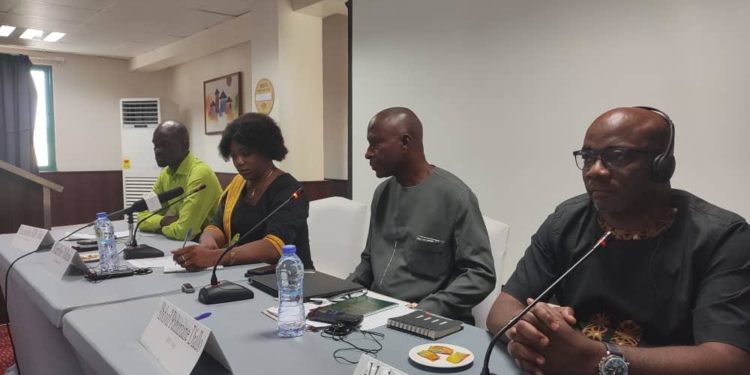For a successful and inclusive political transition process in the three countries
SUMMARY: The wave of coups d’état experienced by West Africa in 2021 and 2022, particularly in Mali, Guinea and Burkina Faso is the result of an exacerbation of social injustice, corruption, mismanagement of public affairs, violence and insecurity.
The intransigence of ECOWAS on a rapid return to constitutional order seems to have created a malaise between the regional organization and the citizens; the solution to which lies in a better communication by ECOWAS on the measures it has taken and the ECOWAS support for the transition of these States, considering the specificity of each country.
THE CHAIRPERSON OF ECOWAS should:
1. Urge the ECOWAS Commission to accompany the military authorities of Mali, Guinea and Burkina Faso in the identification of activities that should constitute the priorities of their transition to a normal constitutional order.
2. Assist in easing the sanctions decided by ECOWAS against the three countries.
3. Involve the political class and civil society actors in negotiations with the military authorities of the three countries.
CONTEXT AND RECOMMENDATIONS: Mali is currently facing a deep crisis that results into an acute tension between the country and its Western partners, on the one hand, because of Mali’s choice to work with supposedly private Russian military groups; and on the other hand, between Mali and ECOWAS for the duration of the transition.
In addition to the heavy sanctions, the country must deal with insecurity and alleged human rights violations. There are major threats to freedom of expression and the press because of the great mistrust between the country’s authorities and their national and international partners.
It should be noted that Mali has held a national conference for the refoundation of the country, the conclusions of which were incorporated into the transition charter following its revision.
In Burkina Faso, the transition process is facing security challenges that led to the overthrow of President Roch Marc Christian KABORE. National consultations were held; based on which it was decided to conduct the transition over a period of three years.
2 Guinea has put in place the transition management bodies and has started holding national consultations in the same format as Mali and Burkina Faso. The country is gradually being sanctioned by ECOWAS.
In all three countries, it appears that nationalist statements and speeches are overshadowing discordant voices. As far as Mali is concerned, the situation is aggravated by the position taken by a couple of high-level authorities. The usual players in the political game are sidelined, as they are responsible for the challenges their country is experiencing and for the exacerbation of corruption and bad governance.
ECOWAS sanctions are certainly legal, but they are not likely to improve the resolution of the problems they address. That is why we advocate for the support of each country instead of sanctions, the only victims of which are the populations. The latter are often now in illusions and deviated from the reality by their leaders.
We recommend that ECOWAS assist States in identifying the highest priorities that a transition could achieve more easily than a normal political regime. These priorities should be based on the outcomes of their national conferences.
The common priorities to all the three countries are:
The revision of the constitution
The review of organic laws that are incompatible with the new constitution, including the electoral law
The census of the population
The organization of referendum and presidential elections
The organization of legislative elections.
In the case of Mali, because of the peace and reconciliation agreement, the organization of regional elections is a major priority.
As far as Guinea is concerned, we recommend that ECOWAS accompany this country in the process of organizing the national conference for the refoundation of the country.
Regarding Burkina Faso, we recommend that ECOWAS accompany the country in implementing the three-year roadmap and not initiate any sanctions.
We call for the lifting of all political, individual and economic sanctions in all the 3 countries in transition.
3 We advocate for technical and financial support to facilitate the return to constitutional normalcy based on a timetable that allows for the implementation of the priorities assigned to the transition as mentioned above. We plead for ECOWAS to collaborate more with CSOs and the media in the resolution of political and social crises in general and in the process of managing transitions.
From: Action Jeunesse Féminine du Burkina Faso
Association Jeunesse Espoir d’Afrique (AJEA) (Burkina Faso)
Alliance Citoyenne pour la Transition (Guinea)
Association des Jeunes pour la Citoyenneté Active et la Démocratie AJCAD (Mali)
Centre pour la Gouvernance Démocratique CGD (Burkina Faso)
Coordination Nationale pour une Transition Réussie – CNTR-(Burkina Faso)
DIACONIA (Burkina Faso)
DONIBLOG (Mali)
Dynamique d’Appui Citoyen à la Transition (Guinea)
Destin en Main (Guinea)
Front Nationale pour la Défense de la Constitution -FNDC (Guinea)
Mali Tribune Mouvement G+ (Guinea)
OBSERVATOIRE -Mali
Réseau des jeunes femmes leaders des partis politiques et de la société civile (REJFPO) – Mali
TUWINDI -Mali
Open Society Initiative for West Africa (OSIWA)






















